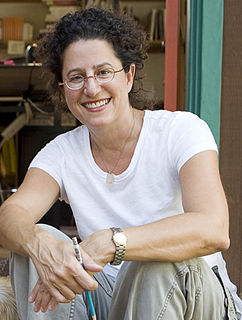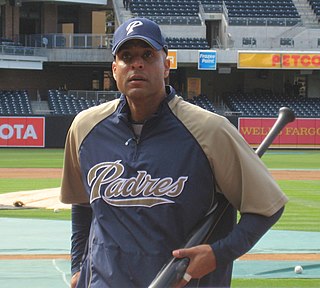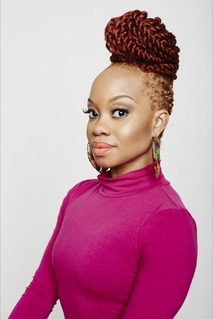A Quote by Marla Frazee
What I had to do was learn how to tell stories with my pictures. At first I didn't even know what that meant because I thought I was already doing it. After all these years of drawing stories and trying to teach it, I think it boils down to a pretty simple rule: it takes time to get to know the characters in a book and the world they inhabit. My first sketches are always horrible. Stereotypical. Contrived. Generic. I have to put in the time in order to deepen them and have it all mean something.
Quote Topics
After
Always
Because
Boils
Book
Characters
Contrived
Deepen
Doing
Down
Drawing
Even
First
Generic
Get
Had
Horrible
How
Inhabit
It Takes Time
Know
Learn
Mean
Meant
Order
Pictures
Pretty
Put
Rule
Simple
Sketches
Something
Stereotypical
Stories
Takes
Teach
Tell
Them
Think
Thought
Time
Trying
World
Years
Related Quotes
Yes, we could talk to you for days on end about all the bad first dates. Those are stories. Funny stories. Awkward stories. Stories we love to share, because by sharing them, we get something out of the hour or two we wasted on the wrong person. But that's all bad first dates are: short stories. Good first dates are more than short stories. They are first chapters. On a good first date, everything is springtime. And when a good first date becomes a relationship, the springtime lingers. Even after it's over, there can be springtime.
Last night I thought about all the kerosene I've used in the past ten years. And I thought about books. And for the first time I realized that a man was behind each one of the books. A man had to think them up. A man had to take a long time to put them down on paper. And I'd never even thought that thought before...It took some man a lifetime maybe to put some of his thoughts down, looking around at the world and life, and then I come along in two minutes and boom! it's all over.
I never have people tell me their stories. I usually have to figure them out myself. Because I know that if people tell me stories, they will expect them to be remembered. And I cannot guarantee that. There is no way to know if the stories stay after I'm gone. And how devastating would it be to confide in someone and have the confidence disappear? I don't want to be responsible for that.
I chose philosophy because it sounded like something I ought to be interested in. I didn't know anything about it, I didn't even know what it was talking about. What I really spent my time doing in those years was writing short stories. There were all sorts of interesting courses, but what I really wanted to do was make stories one way or another.
We are shaped by stories from the first moments of life, and even before. Stories tell us who we are, why we are here, and what will become of us. Whenever humans try to make sense of their experience, they create a story, and we use those stories to answer all the big questions of life. The stories come from everywhere--from family, church, school, and the culture at large. They so surround and inhabit us that we often don't recognize that they are stories at all, breathing them in and out as a fish breathes water.
Writers write because they cannot allow the characters that inhabit them to suffocate them. These characters want to get out, to breathe fresh air and partake of the wine of friendship; were they to remain locked in, they would forcibly break down the walls. It is they who force the writer to tell their stories.
Humans are kind of story-propagating creatures. If you think of how we spend our days, think of all the time you spend on entertainment. How much of your entertainment centers around stories? Most pieces of music tell stories. Even hanging out with your friends, you talk, you tell stories to each other. They're all stories. We live in stories.
I know people who have suffered writer's block, and I don't think I've ever had it. A friend of mine, for three years he couldn't write. And he said that he thought of stories and he knew the stories, could see the stories completely, but he could never find the door. Somehow that first sentence was never there. And without the door, he couldn't do the story. I've never experienced that. But it's a chilling thought.
When he finished up with the Twins and even after he was done, he was always down on the field, so I had a chance to talk to him every time we came into town. Even my first couple of years - when I was still wet behind the ears - he was more than willing to come over and say, 'Hi.' Obviously, he didn't have to introduce himself, but he spent a little time and asked me how I was doing. And it always meant a lot. Anytime you have somebody of that stature on and off the field to take time and be willing to come talk to you, it means a lot.
What's neat about TV is you get really rich, an opportunity to tell really rich stories over the course of 20 hours. Film is cool because it's an hour and a half to two hours. You go on an adventure and by the end it's all cleaned up. Maybe in a franchise you have three chapters of a great story but in TV you can really get deep. You have more time to tell stories so I would definitely not rule out doing television in the future because I think it's a great medium for telling stories.
I continued for too long to do things that I already knew how to do, or to write stories that I was assigned instead of fighting for stories that I couldn't get, or doing ones that I thought were important on my own. The wasting of time is the thing I worry about the most. Because time is all there is.
The hardest stories we tell are always about ourselves. How do you explain that you have been missing your mother for 20 years? I don't know how to explain that to you. I wasn't even sure I wanted to film that, because I don't know how I felt about it. I didn't want to put her through it, and I frankly wasn't ready. Because since I was 16, I just had created my own life for myself, you know? I left when I was 12. I'm 32. And I have gotten to know my mother more through editing her and looking and watching and editing her footage, you know.
About a year after (my stories began being published), magazine editor George Scithers, suggested to me that since I was so new at being published, I must be very close to what I had to learn to move from fooling around with writing to actually producing professional stories. There are a lot of aspiring writers out there who would like to know just that. Write that book.SFWW-I is that book. It's the book I was looking for when I first started writing fiction.


































